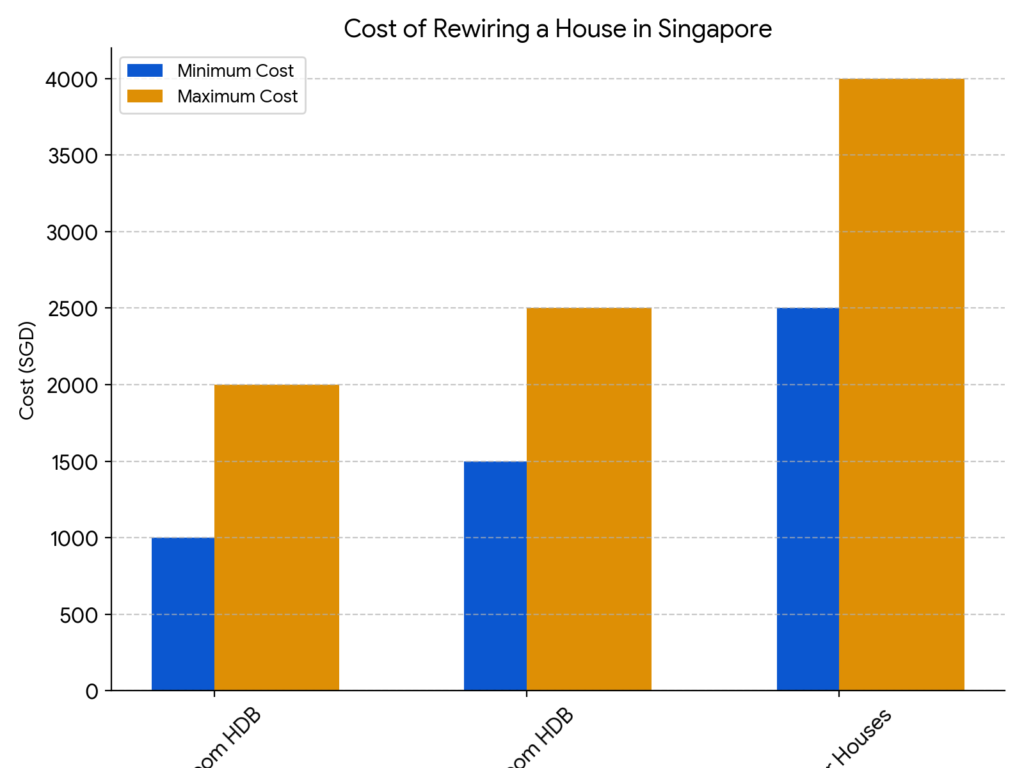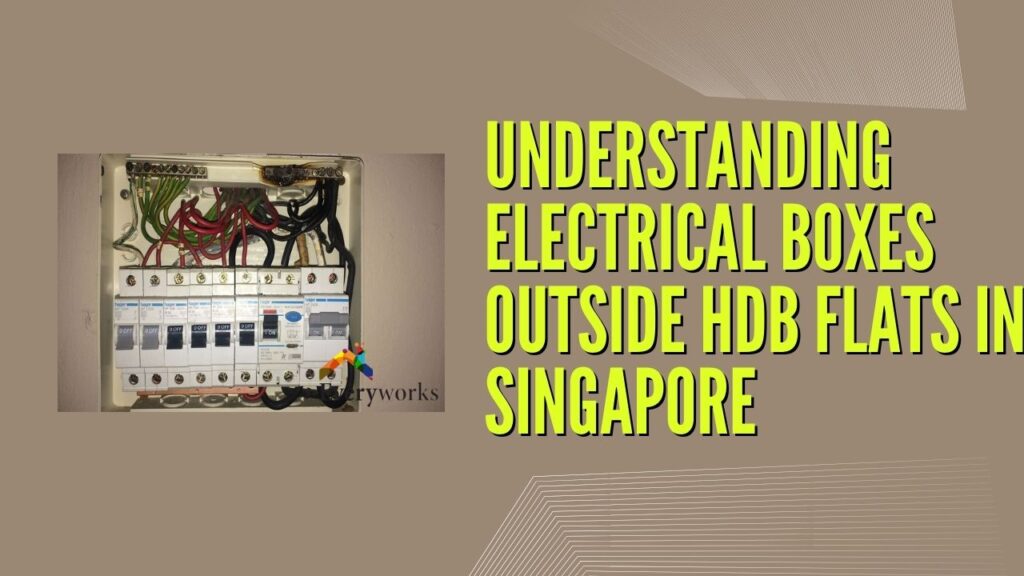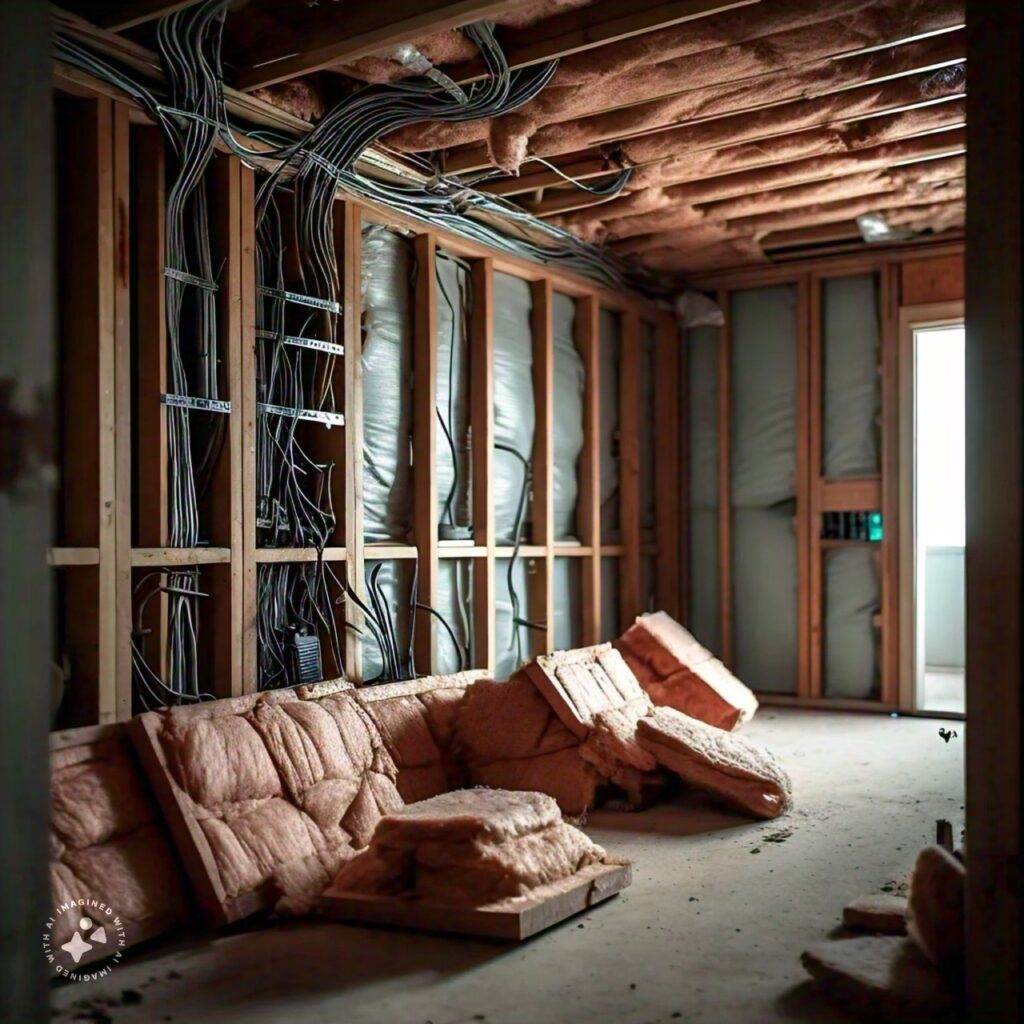Electrical wiring is an essential component of any home, providing the necessary infrastructure for electricity to power our appliances, lights, and devices. Over time, however, wiring can degrade, posing potential safety hazards.
Here’s a guide to help homeowners in Singapore understand when electrical wiring should be replaced, along with an overview of common types of wiring and their typical lifespan.
Average Lifespan of Different Types of Wiring

The lifespan of electrical wires can vary depending on the type of wiring material and environmental factors.
Here’s a general overview of the typical lifespan of common types of electrical wiring:
Knob and Tube Wiring

Lifespan: 30-40 years.
Knob and tube wiring, commonly found in older homes, was widely used in the late 19th and early 20th centuries. While some installations may still function adequately, the lack of grounding and insulation standards make replacement advisable for safety reasons.
Aluminum Wiring:

Lifespan: 40-50 years.
Aluminum wiring gained popularity in residential construction during the 1960s and 1970s. However, it was later discovered to be more prone to oxidation and overheating compared to copper wiring. Homes with aluminum wiring may require replacement or retrofitting to mitigate safety risks.
Copper Wiring:
Lifespan: 50 years or more.
Copper wiring is the standard in modern residential construction due to its durability, conductivity, and safety. With proper installation and maintenance, copper wiring can last for decades, often exceeding 50 years without significant degradation.
7 Signs Your Wirings Needs To Be Changed
- Age of Wiring:

If your home’s wiring is several decades old and has not been updated to meet modern safety standards, it’s wise to consider replacement. Over time, wiring can deteriorate, leading to potential safety hazards.
2. Frequent Circuit Breaker Trips:
If your circuit breaker frequently trips, it could be a sign that your wiring is overloaded or faulty. This indicates that your wiring may not be able to handle the electrical load of modern appliances and devices.
3. Flickering Lights or Dimming:

Dimming or flickering lights, especially when appliances are in use, can indicate voltage fluctuations caused by deteriorating wiring. This is not only inconvenient but also a safety concern that should be addressed promptly.
4. Burning Smells or Scorch Marks

If you notice a burning smell or see scorch marks around outlets or switches, it’s a clear indication of wiring problems. Ignoring these signs can lead to electrical fires, making replacement essential for safety.
5. Rodent Damage
Rodents are known to chew on electrical wiring, causing damage that compromises safety. If you suspect rodent activity in your home, have your wiring inspected for damage and consider replacement if necessary.
6. Outdated Wiring Standards: (Knob and Tube)

Homes with outdated wiring standards, such as knob and tube or aluminum wiring, should consider replacement to meet modern safety codes and standards. These older wiring types may lack proper insulation, grounding, or capacity to handle modern electrical demands.
7. Electrical Shocks or Sparks:
Experiencing electrical shocks or seeing sparks when plugging in or unplugging appliances is a clear indication of wiring issues. These are serious safety hazards that warrant immediate attention and likely replacement of the affected wiring.
Reasons To Replace Out-dated Wiring
As residents of Singapore, we often focus on keeping our homes comfortable and safe. One aspect that shouldn’t be overlooked is the electrical wiring system. As we already talked about, Over time these wires can wear out, leading to various hazards.
Now Let’s talk about the benefits of changing wires
- Safety First:
One of the primary reasons to consider changing your home’s wiring is safety. Over time, wires can degrade due to wear and tear, exposure to elements, or pests. This degradation increases the risk of electrical fires and shocks.
2. Enhanced Efficiency:
Outdated wiring systems may not be equipped to handle the demands of modern electrical appliances and gadgets. As Singaporeans, we rely heavily on various devices for our daily activities. Upgrading your wiring ensures that your home can accommodate these electrical needs efficiently. You’ll experience fewer power fluctuations, which can prolong the lifespan of your appliances and contribute to energy savings in the long run.
3. Compliance with Regulations:
Singapore has stringent regulations in place to ensure the safety of its residents. These regulations often evolve to keep up with advancements in technology and safety standards. By updating your home’s wiring to meet current codes and regulations, you not only comply with the law but also demonstrate your commitment to maintaining a safe living environment for yourself and your neighbors.
4. Preventive Maintenance:
Changing your wiring isn’t just about addressing existing issues; it’s also about preventing future problems. Regular maintenance, including wire replacements, can identify potential hazards before they escalate into major issues. This proactive approach saves you from costly repairs and disruptions to your daily life down the road.
5. Increased Property Value:
If you’re considering selling your home in the future, having updated wiring can significantly boost its appeal to potential buyers. Prospective homeowners prioritize safety and reliability when evaluating properties. By showcasing your upgraded electrical system, you increase the market value of your home and attract more discerning buyers.
How Much Does it cost To Replace Wiring in Singapore

In Singapore, the cost of rewiring a whole house can vary depending on factors such as the size, design, and condition of the home.
Typically, rewiring a whole house ranges between SGD 4,000 and SGD 7,000. However, the specific cost can differ significantly based on the complexity of the wiring job.
For example:
- A 3-room HDB flat may cost between SGD 1,000 and SGD 2,000 for rewiring.
- A 4-room HDB flat may cost between SGD 1,500 and SGD 2,500 for rewiring.
- Larger houses may incur costs above SGD 2,500 due to the increased scale and complexity of the rewiring project.
Conclusion
In the busy world of Singaporean living, it’s easy to overlook things like our home’s electrical wiring. But as we’ve explored, taking the time to change our wires brings big benefits. It keeps us safe from electrical hazards, makes our homes run more smoothly, and even adds value if we ever decide to sell. So, let’s make sure our homes are wired up right, for a safer and brighter future!

